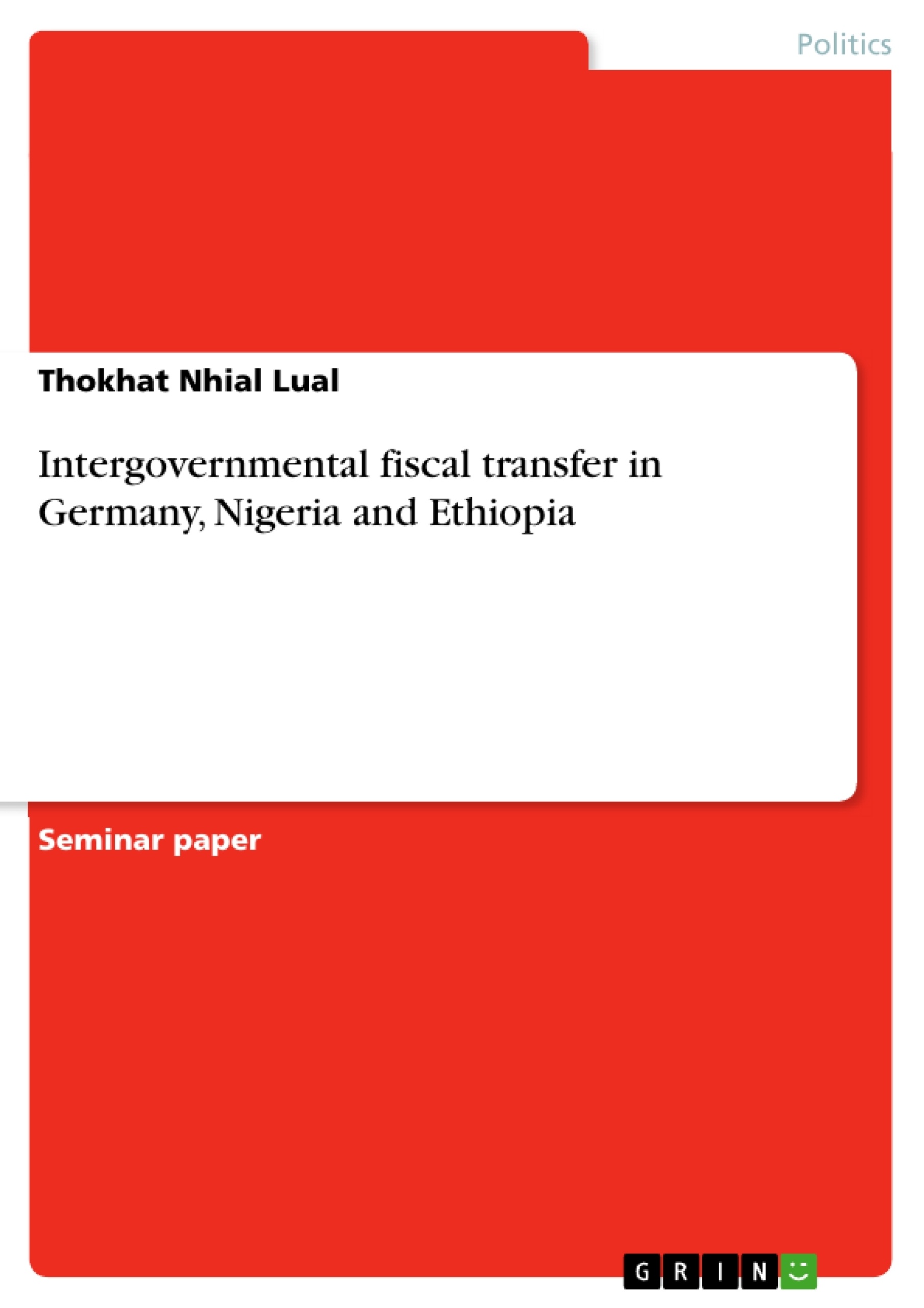The paper deals with intergovernmental fiscal transfer in comparative analysis of Germany, Nigeria and Ethiopia federation. The first chapter concerns about the concept of intergovernmental fiscal transfer and the objective of having intergovernmental fiscal transfer. In chapter two the types of fiscal imbalances are discussed from the view of three federal countries arrangements. Types of intergovernmental fiscal transfer and institutions are examined in chapter three. In addition to that procedure for establishing and modifying intergovernmental transfers as well as the design of intergovernmental transfers are included in this chapter.
Chapter four is particularly concerned in reviewing the legal frame work and experience of three federal countries (Germany, Ethiopia, and Nigeria) on intergovernmental fiscal transfers. The chapter discusses in brief the intergovernmental fiscal transfers legal frame work and practice as well as challenges of each of the three federal countries and dispute resolution mechanism. Lastly the paper ends with a conclusion and the comparative lessons that Ethiopia could draw from the foreign experiences.
Federalism is alleged to serve various purposes that could not be effectively handled by other forms of state formation structures. It is a gain saying that the federal arrangement is chosen for driving a benefit from a strong union without compromising regional autonomy. In federal arrangements that are primarily concerned in devolving powers mainly from the central to the sub national governments. This may also involve assigning expenditure and revenue responsibilities between the federal and regional governments and the need to rectify the fiscal gaps arising there from. This is the subject matter of fiscal federalism. Fiscal federalism is in general dividing the fiscal aspects of the functions of government (expenditure and revenue assignments) and the subsequent need for intergovernmental fiscal transfer between the tiers of government. It is principally concerned in allocating expenditure responsibilities, the revenue raising power, and rectifying the fiscal imbalances between the central and sub national governments through intergovernmental fiscal transfers.
Inhaltsverzeichnis (Table of Contents)
- Introduction
- CHAPTER ONE
- 1. General overview of intergovernmental fiscal Transfer
- 1.1 Definition of intergovernmental fiscal transfer.
- 1.2 Rationales and purpose for intergovernmental Fiscal Transfers.
- 1.3 Objectives of intergovernmental fiscal transfers.
- 1. General overview of intergovernmental fiscal Transfer
- CHAPTER TWO
- 2. Concept of Fiscal imbalance.
- 2.1 Vertical fiscal imbalance.......
- 2.2 Horizontal fiscal imbalance
- 2. Concept of Fiscal imbalance.
- CHAPTER THREE
- 3. Intergovernmental fiscal transfer Types and Institutions.
- 3.1 Types of Intergovernmental fiscal transfer.
- 3.2 The Design of Intergovernmental Transfers: Types and Mechanisms
- 3.3 Procedures for Establishing and Modifying Intergovernmental Transfers
- 3.4 Institutions for Intergovernmental Fiscal Transfers.
- 3. Intergovernmental fiscal transfer Types and Institutions.
- CHAPTER FOUR
- 4.1 Legal framework and practice of intergovernmental fiscal transfers.
- 4.2 Dispute Resolution and Adjudication
- 4.3 Challenges of fiscal transfer.
Zielsetzung und Themenschwerpunkte (Objectives and Key Themes)
The primary aim of this work is to analyze intergovernmental fiscal transfers in a comparative framework, focusing on the experiences of Germany, Nigeria, and Ethiopia. The study delves into the concept, purpose, and types of fiscal imbalances, as well as the institutional frameworks for managing these transfers. Furthermore, it examines the legal framework and practical challenges associated with intergovernmental fiscal transfers in the selected countries.
- Concept and Types of Fiscal Imbalances (Vertical and Horizontal)
- Intergovernmental Fiscal Transfers: Purpose and Objectives
- Types of Intergovernmental Fiscal Transfers and Mechanisms
- Legal Frameworks and Practices of Intergovernmental Fiscal Transfers
- Challenges and Dispute Resolution in Intergovernmental Fiscal Transfers
Zusammenfassung der Kapitel (Chapter Summaries)
Chapter One provides a comprehensive overview of the concept of intergovernmental fiscal transfers, emphasizing their role in bridging horizontal and vertical fiscal imbalances between different levels of government. The chapter delves into the rationales and objectives behind such transfers, highlighting their crucial role in promoting fiscal equity and stability.
Chapter Two focuses on the concept of fiscal imbalances, particularly differentiating between vertical and horizontal imbalances. This chapter explores the challenges and implications of these imbalances for effective governance and development.
Chapter Three delves into the various types of intergovernmental fiscal transfers, examining their design, mechanisms, and the institutions responsible for their implementation. The chapter also explores the procedures for establishing and modifying such transfers, shedding light on the complex processes involved in intergovernmental fiscal relations.
Chapter Four undertakes a comparative analysis of the legal framework and practical experience of intergovernmental fiscal transfers in Germany, Ethiopia, and Nigeria. This chapter provides insights into the specific regulations and challenges associated with these transfers in each country, highlighting the diverse approaches to fiscal federalism.
Schlüsselwörter (Keywords)
Key terms and concepts central to this work include intergovernmental fiscal transfer, fiscal federalism, vertical fiscal imbalance, horizontal fiscal imbalance, fiscal capacity, revenue sharing, grants, legal framework, institutional design, comparative analysis, challenges, dispute resolution, Germany, Ethiopia, Nigeria.
Frequently Asked Questions about Intergovernmental Fiscal Transfer
What is an intergovernmental fiscal transfer?
It is the transfer of financial resources between different levels of government (e.g., federal to regional) to bridge fiscal gaps.
What is the difference between vertical and horizontal fiscal imbalance?
Vertical imbalance occurs when revenue and expenditure responsibilities don't match between levels of government; horizontal imbalance refers to fiscal capacity differences between regions at the same level.
Why do federal countries like Germany, Nigeria, and Ethiopia use fiscal transfers?
To promote fiscal equity, ensure minimum service standards across all regions, and maintain national economic stability.
What are the common challenges in fiscal transfer systems?
Challenges include political disputes over allocation formulas, lack of transparency, and ensuring regional autonomy while maintaining central control.
How are disputes over fiscal transfers resolved?
Disputes are typically handled through constitutional courts, intergovernmental committees, or specific legal adjudication mechanisms defined in the federal framework.
- Quote paper
- Thokhat Nhial Lual (Author), 2018, Intergovernmental fiscal transfer in Germany, Nigeria and Ethiopia, Munich, GRIN Verlag, https://www.grin.com/document/464935



